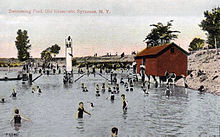Not to be confused with Onondaga Lake Park. United States historic place
| Onondaga Park | |
| U.S. National Register of Historic Places | |
 Postcard from 1910 showing Hiawatha Lake in Upper Onondaga Park Postcard from 1910 showing Hiawatha Lake in Upper Onondaga Park | |
  | |
| Location | Syracuse, New York |
|---|---|
| Coordinates | 43°01′38″N 76°09′47″W / 43.02722°N 76.16306°W / 43.02722; -76.16306 |
| Built | 1898 |
| Architect | George Kessler, Thurber J. Gillette |
| Architectural style | Colonial Revival |
| MPS | Historic Designed Landscapes of Syracuse MPS |
| NRHP reference No. | 02001657 |
| Added to NRHP | 2002-12-31 |
Onondaga Park is an 82.6-acre (33.4 ha) park in the city of Syracuse, New York. Man-made Hiawatha Lake is located within the park, which is situated in Syracuse's Strathmore neighborhood on the city's south side.
Portions of the park were designed by famed urban planner George Kessler in the early 20th century. The park was placed on the National Register of Historic Places in 2002.
Park description
Onondaga Park consists of two neighboring sections, Lower Onondaga Park and Upper Onondaga Park. Upper and Lower Onondaga parks are linked with nearby Kirk Park via Onondaga Creek Boulevard, a parkway completed in 1930. The three parks, together with the parkway, form the only interconnected park system in Syracuse.
Lower Onondaga Park
Lower Onondaga Park is 15.6 acres (6.3 ha) in size, and contains a baseball diamond and a greenhouse which supplies plants used by many of Syracuse's parks.
This portion of the park was originally landscaped according to designs by urban planner George Kessler, who was hired to design the park in 1907. The park was completed according to Kessler's designs in 1915, featuring extensive stonework and several ponds, including Star Lake, which contained five fountain jets. A large neoclassical greenhouse, designed by a local architect, was added in 1917. Although some remnants of Kessler's original landscaping remain, several changes in the years that followed have obscured the original design, including the channelization of Onondaga Creek in 1927, and the city's decision to fill in Star Lake in the 1970s.
Upper Onondaga Park

The 67-acre (27 ha) Upper Onondaga Park is built around Hiawatha Lake. This portion of the park also includes eight tennis courts, three basketball courts, a playground, and a 50-metre (160 ft) swimming pool with the capacity to hold 352 bathers.
Upper Onondaga Park occupies the site of the former Wilkinson Reservoir, which was built to supply Syracuse with water in the 1870s. The city acquired the reservoir and surrounding land in 1892 and opened the area as a park in 1898.
Hiawatha Lake
In 1911, Wilkinson Reservoir was re-contoured as a 17-acre (6.9 ha) man-made lake, and has since been known as Hiawatha Lake.

One side of Hiawatha Lake was filled back in and a modern swimming pool was built. In the winter, the lake freezes and local residents use it for pond hockey.
The lake is used for its picturesque quality and large gazebo and often serves as a backdrop for prom and wedding photos.
References
- ^ "National Register Information System – Onondaga Park (#02001657)". National Register of Historic Places. National Park Service. 2013-11-02. Retrieved 2022-04-20.
- "Onondaga Park". Geographic Names Information System. United States Geological Survey, United States Department of the Interior. Retrieved 2022-04-20.
- "Neighborhoods in Syracuse". Visit Syracuse. Archived from the original on 2022-01-18. Retrieved 2022-04-20.
- Hogue, Diana; Biancavilla, Dean (April 2002). Capella-Peters, Chris; Krattinger, William E. (eds.). "New York MPS Onondaga Park". National Archives and Records Administration. p. 20. Archived from the original on 2022-04-20. Retrieved 2022-04-20.
- Breed, Dudley C. Jr.; Morfei, Marc J.; Lozner, Christine B.; Auyer, Peter V. (July 1994). "Section F - Associated Property Types - Parks". National Register of Historic Places Multiple Property Documentation: The Historic Designed Landscapes of Syracuse, New York. National Park Service (Report). p. 110. Retrieved 2015-10-03.
- "Lower Onondaga Park". City of Syracuse. 2009. Archived from the original on 2021-04-23. Retrieved 2022-04-20.
- "New York — Syracuse — Lower Onondaga Park". Kessler Society of Kansas City. Archived from the original on 2021-04-19. Retrieved 2015-09-24.
- "Upper Onondaga Park". City of Syracuse. 2009. Archived from the original on 2021-04-23. Retrieved 2022-04-20.
- ^ Hardin, Evamaria (1993). Syracuse Landmarks: An AIA Guide to Downtown and Historic Neighborhoods. New York: Syracuse University Press. p. 298. ISBN 978-0-8156-2599-5. LCCN 92035000. OCLC 756972033. OL 1730548M. Retrieved 2022-04-20 – via Internet Archive.
- "Syracuse Pond Hockey Classic". Syracuse Pond Hockey Classic. Archived from the original on 2022-04-01. Retrieved 2022-04-20.
- Griffin-Nolan, Ed (2010-08-04). "Urban Oasis" (PDF). Syracuse New Times. Archived from the original (PDF) on 2015-09-26. Retrieved 2015-09-25.
| U.S. National Register of Historic Places in New York | ||
|---|---|---|
| Topics |   | |
| Lists by county |
| |
| Lists by city | ||
| Other lists |
| |